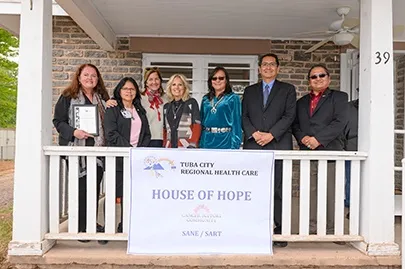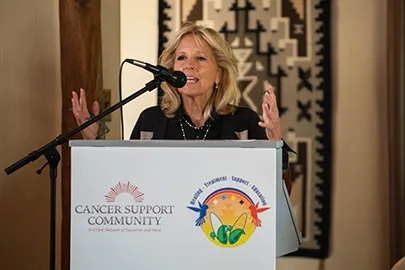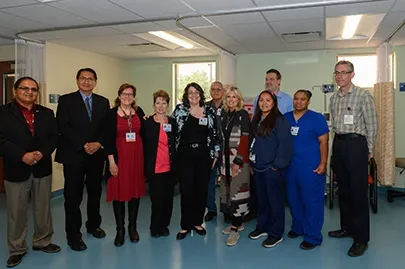Tribal and Health Leaders Mark Major Advancement in Cancer Care for American Indians

TUBA CITY, AZ – Leaders of the Navajo Nation, the Tuba City Regional Health Care Corporation (TCRHCC), and the Cancer Support Community (CSC) joined Dr. Jill Biden on the Navajo Nation in marking a milestone moment: the opening of the first full-time cancer care center on an American Indian Reservation.
The culturally-adapted cancer care center at TCRHCC will provide oncology services to the Navajo and Hopi people. In addition, the programming will include patient- and caregiver-support and navigation TCRHCC developed in partnership with CSC, a global nonprofit that operates at 196 locations worldwide. CSC also secured funding from the Barbara Bradley Baekgaard Family Foundation to help launch this initiative.
The new center will fill a gap in cancer treatment that affects many American Indians, as the Indian Health Service provides primary medical care, but specialty care – including oncology – is beyond its mission. Consequently, patients on the Navajo Nation—which is the size of West Virginia—must travel hundreds of miles from home to access cancer treatment and support services. Accessibility is an issue, as transportation costs of seeking off-reservation cancer care can be insurmountable barriers to treatment for American Indian patients who live in communities where unemployment rates are above 50 percent and household incomes are below the national poverty level.



The two-day commemoration included remarks from Navajo Nation President Jonathan Nez and Dr. Jill Biden. Dr. Biden’s advocacy for cancer patients has included support for this effort during the Obama administration and as part of the Biden Cancer Initiative. President Nez and Dr. Biden joined Lynette Bonar, CEO of TCHRCC, and Kim Thiboldeaux, CEO of CSC, and other leaders, including officials from Penn Medicine, for a tour of the new treatment center where they met with the oncologists providing care and heard from patients and caregivers. In addition, they visited the House of Hope, a location near TCRHCC where patients and caregivers will access support and navigation services.
The delegation of leaders from organizations and companies that provided funding for this initiative included the Barbara Bradley Baekgaard Family Foundation, Eisai, Merck, and Pfizer.
“The Navajo Nation was honored to welcome former Second Lady Dr. Jill Biden, the Cancer Support Community, and many health industry leaders and professionals to the Tuba City Regional Health Care Corporation in support of the very first cancer treatment center in Indian Country,” President Nez said. “Working together through strong partnerships is key to providing these much needed services for our Diné people who require cancer treatment. On behalf of the Nez-Lizer Administration, we thank everyone for supporting this initiative.”
“Thank you, President Nez and the Navajo Nation, for such a warm welcome,” Dr. Jill Biden said. “Today’s landmark moment is a testament to the power of sharing what we know, listening to different perspectives and experiences, and working together to make tangible differences in people’s lives. In short, collaboration gets results.”
“It is wonderful to have a partnership with the Cancer Support Community and hear such encouraging words from Dr. Biden and President Nez. The specialty care center and the House of Hope will have such a positive impact on our patients and their loved ones,” said Lynette Bonar, CEO of TCRHCC, whose staff led the delegation’s tour of the new specialty care center and the House of Hope.
“It is unacceptable that people affected by cancer on the Navajo Nation must travel hundreds of miles to get cancer care,” said Kim Thiboldeaux, CEO of the Cancer Support Community and a member of the Biden Cancer Initiative’s Board of Directors. “The Cancer Support Community is honored to be working with the Tuba City Regional Health Care Corporation to right this wrong and make ground-breaking, culturally-adapted patient and caregiver resources a reality for the Navajo people. Today’s announcement means better access to screenings, treatment, navigation, counseling, and other patient-focused services.”